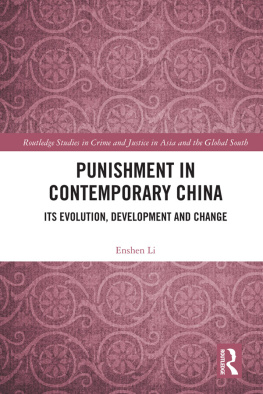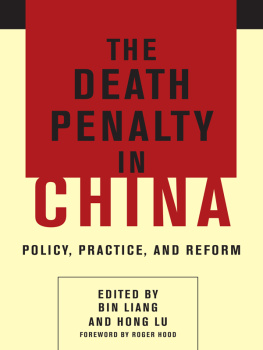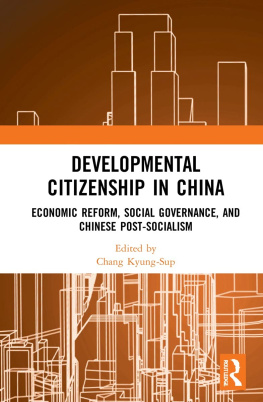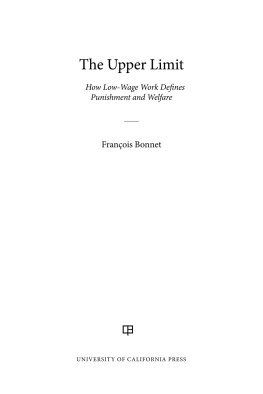Punishment in Contemporary China
Punishment in contemporary China has experienced dramatic shifts over the last seven decades or so. This book focuses on the evolution, development and change of punishment in the Maoist (19491977), reform (19782001) and post-reform eras (2002present) of China to understand the shaping and transformation of punishment within the context of a range of socio-cultural changes across different historical periods.
It aims to fill the gap of existing research by developing a distinctive theoretical framework for the Chinas penality, exploring it as a separate and complex legal-social system to observe the impact social foundations, political-economic genesis, cultural significance and meanings have exerted on penal form, discourse and force in contemporary China. It sheds light on the sociology of punishment in this socialist Party-state by investigating law reform, penal policy, social control, crime prevention and sentencing as interconnected elements in the criminal justice and penal system.
This book will be of great interest to those who study Chinese criminal law, penal and policing system, as well as to law academics, criminologists and sociologists whose research interests lie in the fields of comparative criminology and criminal justice.
Enshen Li is a lecturer at the TC Beirne School of Law, The University of Queensland. His research interests lie in the field of comparative criminal justice, theoretical criminology, socio-legal studies of punishment and society. Dr Enshen Li specializes in the Chinese criminal justice and penal system and their implications for culture and society.
Routledge Studies in Crime and Justice in Asia and the Global South
Edited by Wing Hong Chui
City University of Hong Kong
Russell Hogg
Queensland University of Technology
John Scott
Queensland University of Technology
Crime and justice studies, as with much social science, has concentrated mainly on problems in the metropolitan centres of the Global North, while Asia and the Global South have remained largely invisible in criminological thinking. This research series aims to redress this imbalance by showcasing exciting new ways of thinking and doing crime and justice research from the global periphery.
Bringing together scholarly work from a range of disciplines, from criminology, law, and sociology to psychology, cultural geography and comparative social sciences, this series offers grounded empirical research and fresh theoretical approaches and cover a range of pressing topics, including international corruption, drug use, environmental issues, sex work, organized crime, innovative models of justice, and punishment and penology.
Punishment in Contemporary China
Its Evolution, Development and Change
Enshen Li
For more information about this series, please visit: www.routledge.com/criminology/series/RSCJAGS
Punishment in Contemporary China
Its Evolution, Development and Change
Enshen Li
First published 2019
by Routledge
2 Park Square, Milton Park, Abingdon, Oxon OX14 4RN
and by Routledge
711 Third Avenue, New York, NY 10017
Routledge is an imprint of the Taylor & Francis Group, an informa business
2019 Enshen Li
The right of Enshen Li to be identified as author of this work has been asserted by him in accordance with sections 77 and 78 of the Copyright, Designs and Patents Act 1988.
All rights reserved. No part of this book may be reprinted or reproduced or utilised in any form or by any electronic, mechanical, or other means, now known or hereafter invented, including photocopying and recording, or in any information storage or retrieval system, without permission in writing from the publishers.
Trademark notice: Product or corporate names may be trademarks or registered trademarks, and are used only for identification and explanation without intent to infringe.
British Library Cataloguing-in-Publication Data
A catalogue record for this book is available from the British Library
Library of Congress Cataloging-in-Publication Data
Names: Li, Enshen, 1981 author.
Title: Punishment in contemporary China : its evolution, development and change / Enshen Li.
Description: 1 Edition. | New York : Routledge, 2018. | Series: Routledge studies in crime and justice in Asia and the global South | Includes bibliographical references and index.
Identifiers: LCCN 2018013564 | ISBN 9781138485839 (hardback) | ISBN 9781351039383 (ebook)
Subjects: LCSH: PunishmentChinaHistory.
Classification: LCC HV8519 .L5 2018 | DDC 364.60951dc23LC
ISBN: 978-1-138-48583-9 (hbk)
ISBN: 978-1-351-03938-3 (ebk)
Typeset in Bembo
by Apex CoVantage, LLC
To Li Kejian and Chen Qin
Punishment in contemporary China (The Peoples Republic of China) has experienced dramatic transformations over the last seven decades or so. This book focuses on the evolution, development and change of punishment in the Maoist (19491977), reform (19782001) and post-reform eras (2002) of China to understand the shaping and transformation of punishment within the context of social, political and economic processes and arrangements across different historical periods. In this book, I aim to fill the gap of existing research by developing a distinctive theoretical framework for Chinas penality, exploring it as a separate and complex legal-social system to reveal its implications for historical processes, legal developments, social transformations and cultural discourses alike in the contemporary eras. More specifically, I focus on a comprehensive delineation of the development of and change in penal policy, social control, law reform and sentencing and investigate how the social foundations, political-economic genesis, cultural significance and meanings at different historical stages have shaped the rhetoric and implementation of punishment. To this end, this book presents a socio-legal analysis of Chinas modern penal system. It not only touches on the legal debate of punishment in terms of its legislative and policy transformations but provides a sociological account of penality to discern its association with a range of social changes that have occurred in the fields of economy, politics and culture over the past 70 years.
In doing so, I introduce some major sociological theories of punishment developed in the Anglo-American countries as a backdrop against which the development of punishment in contemporary China can be better understood and perceived. My intention is not to produce a comparative catalogue of laws and policies that simply describes the similarities and differences of punishment between China and some Western jurisdictions. Nor do I wish to apply the north Atlantic sociology of penality to the Chinese context to test its universality in a culturally divergent jurisdiction China. Rather, I focus more on unpacking the connotations of these Western theories of punishment as a lens to unfold the trajectory of punishment in China and identify indigenous cultural dynamics and patterns of social and political arrangements that have interacted with and impacted the penal system in this Party-state. In this book, I argue that punishment in contemporary China is driven by and intertwined with an array of political considerations, social changes and economic policies that have come to shape its current form and characteristics. While punishment in Maoist and reform China remained relatively punitive, functioning principally as a populist means to deliver retributive and deterrent justice, since the early 2000s punishment in China has been gradually moderated in parallel with a series of socio-political shifts towards a soft and rational mode of state governance. This change is exemplified by the reduced extent of punitive justice in penal practice and increased use of lenient sentencing and punishment that aims at transformation and correction of offenders.







